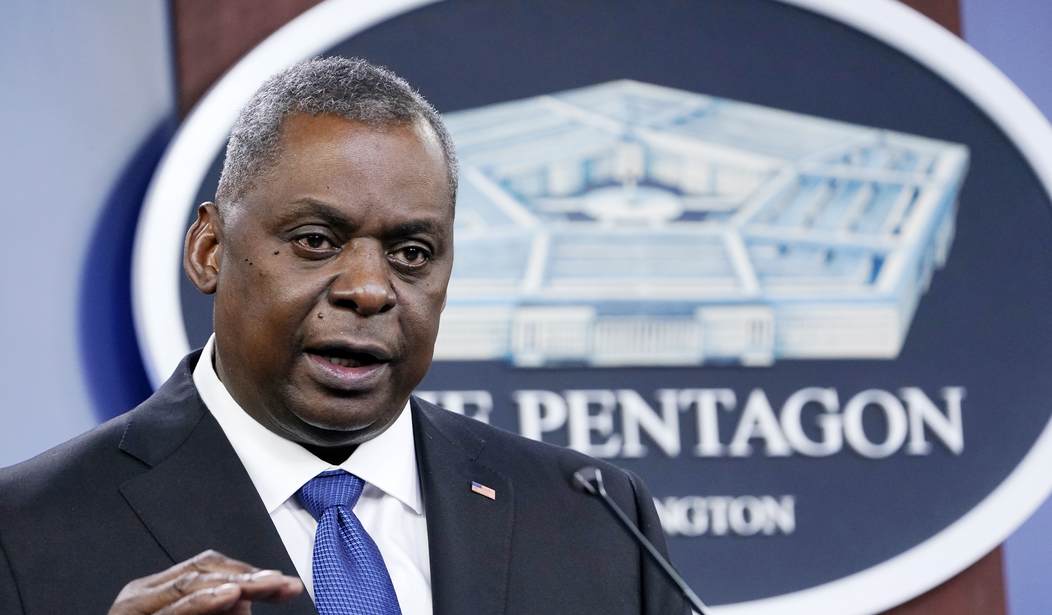The Pentagon announced on Thursday night that "self-defense" strikes approved by President Biden against Iranian facilities reportedly used by its Islamic Revolutionary Guard Corps and affiliated militias in Syria were carried out, finally showing some response to recent attacks targeting U.S. forces in the Middle East.
SecDef Austin on retaliatory strikes carried out in Syria moments ago:
— Jacqui Heinrich (@JacquiHeinrich) October 27, 2023
"Today, at President Biden’s direction, U.S. military forces conducted self-defense strikes on two facilities in eastern Syria used by Iran’s Islamic Revolutionary Guard Corps (IRGC) and affiliated groups.
As Townhall reported earlier, the Pentagon said U.S. forces in the Middle East had been targeted in drone and rocket attacks at least 13 times over the previous week, injuring dozens of Americans and leading the death of at least one contractor who died of a heart attack while scrambling to find shelter.
Richard Goldberg, a senior advisor to the Foundation for Defense of Democracies (FDD), noted on X, formerly Twitter, that the U.S. strikes against IRGC targets in Syria were "[l]ong overdue" and urged awaiting more details on who and what exactly got hit in the strike before heaping too much praise on the strikes.
Long overdue & likely lowest possible retaliation threshold. More details to come but tracks with past responses (the few over 2.5 years). Will be interested to know if IRGC hit or just Arab militias. Any casualties or just empty building. Need details. But *a* response finally.
— Richard Goldberg (@rich_goldberg) October 27, 2023
As of now, any damage assessments following the U.S. strikes have not been made public.
Noting how long it took for action to happen, one of the details Goldberg is looking to learn is whether the U.S. waited for any IRGC personnel who may have been at the targets to safely depart — a significant question.
Recommended
Khamenei is likely not impressed. Will be very curious to hear more on why there was a long delay between POTUS approval and strike. Did they wait for the IRGC personnel to clear out before hitting it? Important question. Remember a contractor is dead and 20+ troops injured.
— Richard Goldberg (@rich_goldberg) October 27, 2023
Goldberg also pointed to the fact that the low bar set by the Biden administration in recent similar retaliations means many people were "hyping the lowest possible retaliation after a week of waiting" for action from the U.S. "Let's look at the chess board from Tehran, not Washington," he added.
Of course, it has everything to do with Hamas, Hezbollah, Iraqi militias, Houthis, Iran itself. This is Iran’s war. We are hyping the lowest possible retaliation after a week of waiting. Let’s look at the chess board from Tehran, not Washington. https://t.co/4PNZ5u5o6B
— Richard Goldberg (@rich_goldberg) October 27, 2023
In the Biden administration's statement on the strikes, Defense Secretary Lloyd Austin noted that "Iran wants to hide its hand and deny its role in these attacks against our forces," pledging the U.S. "will not let them."
"If attacks by Iran’s proxies against U.S. forces continue, we will not hesitate to take further necessary measures to protect our people," Sec. Austin promised. If that's the administration's position, however, why hasn't that logic been applied to other Iran-backed attacks? That's another question posed by Goldberg as we await more information on what was taken out by the strikes announced Thursday night.
What’s notable is that this statement could be applied elsewhere. Like the October 7th massacre. Or Hezbollah in the north. Or Houthi cruise missiles. The 3-week attempt to have a Hamas policy and a separate but contradictory Iran policy is slowly collapsing. As it should. https://t.co/Xyl2S833KY
— Richard Goldberg (@rich_goldberg) October 27, 2023
Whatever the toll of the U.S. attacks on IRGC facilities in Syria, Goldberg is right: the attempts to view and treat Iran-backed Hamas barbarians differently than other Iran-backed groups carrying out attacks is not a distinction that can last much longer.

























Join the conversation as a VIP Member